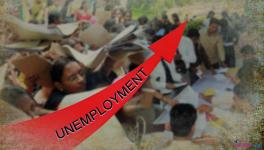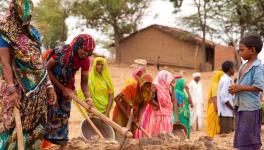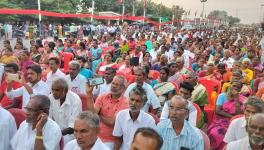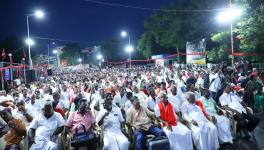Pending Wages, no Work: Bengal MGNREGA Workers Bear Brunt
Image Courtesy: PTI
West Bengal MGNREGA workers, part of a broader 100-day protest at New Delhi’s Jantar Mantar by daily wagers across the country eligible for employment under the Act, submitted a memorandum at the National Human Rights Commission’s office in the Capital on Saturday demanding payment of one-year pending wages.
Chanting slogans, giving speeches, holding pamphlets and standing in unison, Bengal’s rural workers, primarily women, are heavily indebted.
“I have not been employed since February 2022 with wages for 21 days still pending. I have no option but to do menial labour in other’s fields and any other job I find,” Sandhya, a worker from Bengal’s Purulia district, tells Newsclick.
Sandhya, a mother of two, is now dependent on well-to-do villagers who provide her with a day’s job that doesn’t fetch more than Rs 100.
The pandemic abruptly cut short her children’s education. “When things reopened, and I started getting work by 2021-end, I thought my children would attend school again,” she says. But with pending wages and no work, she feels only government intervention can end her misery.
As per the ministry of rural development data, the participation of rural women in MGNREGS was around 54% in 2021-22. Their situation is worse, according to the protesters, with women workers paid less by wealthy villagers offering work.
Highlighting the disparity and the struggle of women workers in eight states she visited, CPI (M) Politburo and former Rajya Sabha member Brinda Karat said during a press conference in New Delhi on Friday, “Women who work at MGNREGA sites lift 2,500-3,000 kgs of mud daily. Still, the disparity is very evident.”
Anita Gope, from Paschim Bardhaman, has been desperately hunting for employment for the past year but gets not more than two to three days of monthly work.
Under heavy debt and unable to afford costly LPG, a teary Gope says, “I cannot handle this anymore. Everything is falling apart. The government owes my husband and me wages for 45 days.”
With the family in dire straits, she sent her only son Shanu to look for work in Jharkhand last October. Despite being a graduate, he is doing an underqualified and underpaid job at a Ranchi factory.
The protesting workers narrated how they approached authorities at every level—from the village Panchayat to the BDO and the district magistrate to others—but it was useless.
“We approached the Panchayat several times but were told that the Narendra Modi government is not providing money to the state due to which there was no work. When we mention our miseries and the condition of our households, they shoo us away as if we are animals,” says Gope.
The Centre’s flagship job guarantee programme MGNREGS saw a 33% cut in outlay from its revised estimates of Rs 89,400 crore in the current fiscal to Rs 60,000 crore in the budgetary allocation for FY23-24.
Karat said that not providing jobs to the poor and reducing the allocation for the scheme is “anti-poor”. “I have seen women queue up for more than an hour before beginning to work. This is more work than they are supposed to do,” she said.
As for her daily routine, Sandhya now cooks once a day instead of thrice. “From where do I get the money for the ingredients? Oil is so expensive that I cannot afford it. At times, my family consumes only rice.”
After cooking the meal, which is consumed twice a day, Sandhya hunts for a job. If she finds a job, which doesn’t fetch more than Rs 100 a day, she does it. Else, she spends Rs 30 on bus fare while travelling around 30 km daily in search of work. If an employer provides food to Sandhya, an equivalent amount—Rs 10-Rs 20—is deducted from her wages.
MGNREGA workers from several other states will join the protest in the coming days with villagers from Jharkhand joining on March 15.
Get the latest reports & analysis with people's perspective on Protests, movements & deep analytical videos, discussions of the current affairs in your Telegram app. Subscribe to NewsClick's Telegram channel & get Real-Time updates on stories, as they get published on our website.
























